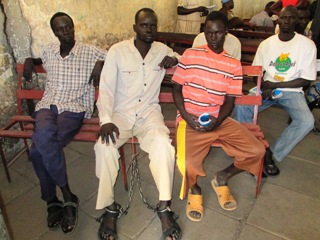N. Bahr el Ghazal: Four inmates die from overcrowding, diseases
January 10, 2013 (JUBA) – At least four inmates at a central prison in Aweil, the Northern Bahr El Ghazal state capital have reportedly died from illness and overcrowding, eye witnesses told Sudan Tribune.

Jackline Nyibol, the state minister of information admits some inmates could have died because of over congestion in the prison. She however denied reports of an alleged outbreak of the viral hemorrhage fever in the cell.
“There is a rumor that there is an outbreak [of] diseases in Northern Bahr el Ghazal State, which [is] not true yet. I want to assure the public especially people of Northern Bahr el Ghazal and South Sudan in particular that we do not have any outbreak of any disease in Aweil at the moment,” Nyibol told Sudan Tribune.
A World Health Organization (WHO) official, who preferred anonymity, also denied claims of any disease outbreak, describing the health situation in Aweil prison as “normal”.
“As of yesterday night up to today afternoon, there is no prisoner in all the cells with signs and symptoms like for viral hemorrhage fever and especially with quoted sign, the nose bleeding. The general situation regarding [the] reported incidence is normal,” said the official.
Other sources, however, claimed some specimens were collected from prisoners in the cell and would be sent to Juba, the South Sudan capital for tests.
“11 more samples are collected today [Monday] to be sent [to Juba] on Friday. The targets were those who share the cell with the deceased, especially the one with nose bleeding also those who slept close to other prisoner with nose bleeding,” a source told Sudan Tribune.
“As of 1600hrs today 8 January 2013, from the Director of the Aweil Civil Hospital under the Ministry of Health, Dr. Garang, has verified 4 deceased male prisoners and 1 remaining male prisoner alive (previously reported deceased) currently in isolation and undergoing medical-lab investigation by a joint WHO and Ministry of Health team,” an updated statement from the state ministry of health reads in part.
It adds, “Three of the four deceased male prisoners were declared dead due to 2 cases of malaria and 1 case of severe, acute anemia. They did not exhibit any bleeding from facial orifices”.
Meanwhile, WHO, the statement further notes, has launched an investigation into what could have killed the four inmates.
Last year, a report by the US-based Human Rights Watch, deplored the poor state of detention centers across the 10 state of South Sudan, saying its “flawed processes, unlawful detentions, and dire conditions” reflect the urgent need to improve the country’s justice system.
The 105-page report, “Prison Is Not for Me: Arbitrary Detention in South Sudan”, documents violations of due process rights, patterns of wrongful deprivation of liberty, and the harsh, unacceptable prison conditions in which detainees live.
A third of the young nation’s prison population, according to the report, have not been convicted of any offense or in some cases even charged with one, but are detained, often for long periods, waiting for police, prosecutors, and judges to process their cases.
Most of the detainees, it adds, lack legal representation because they can hardly afford to hire lawyers and South Sudan still lacks a functional legal aid system.
(ST)
